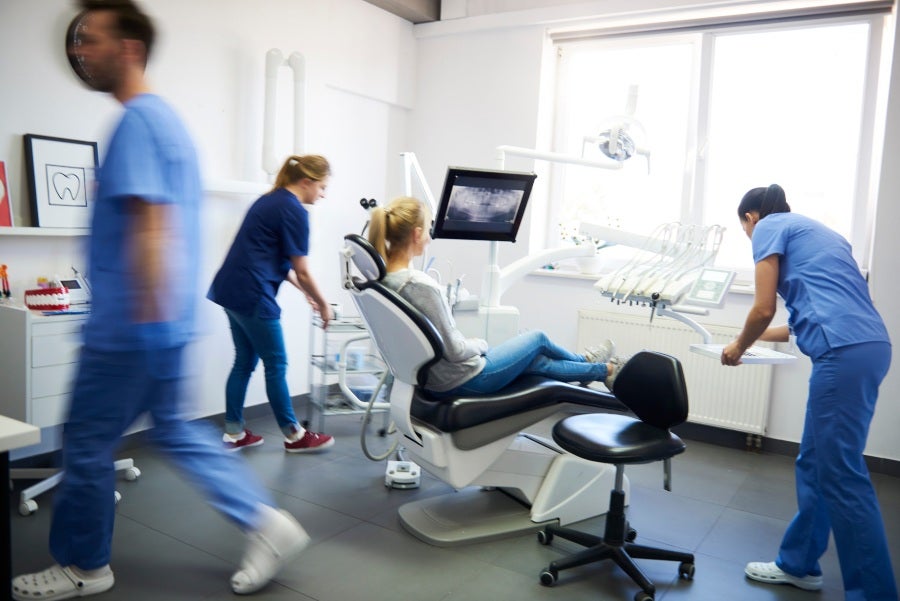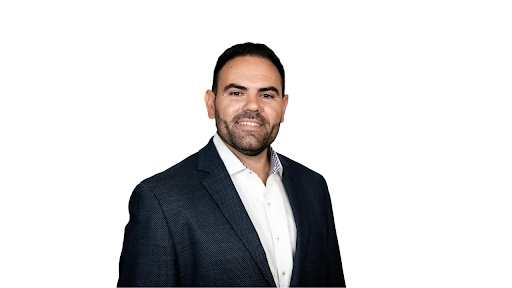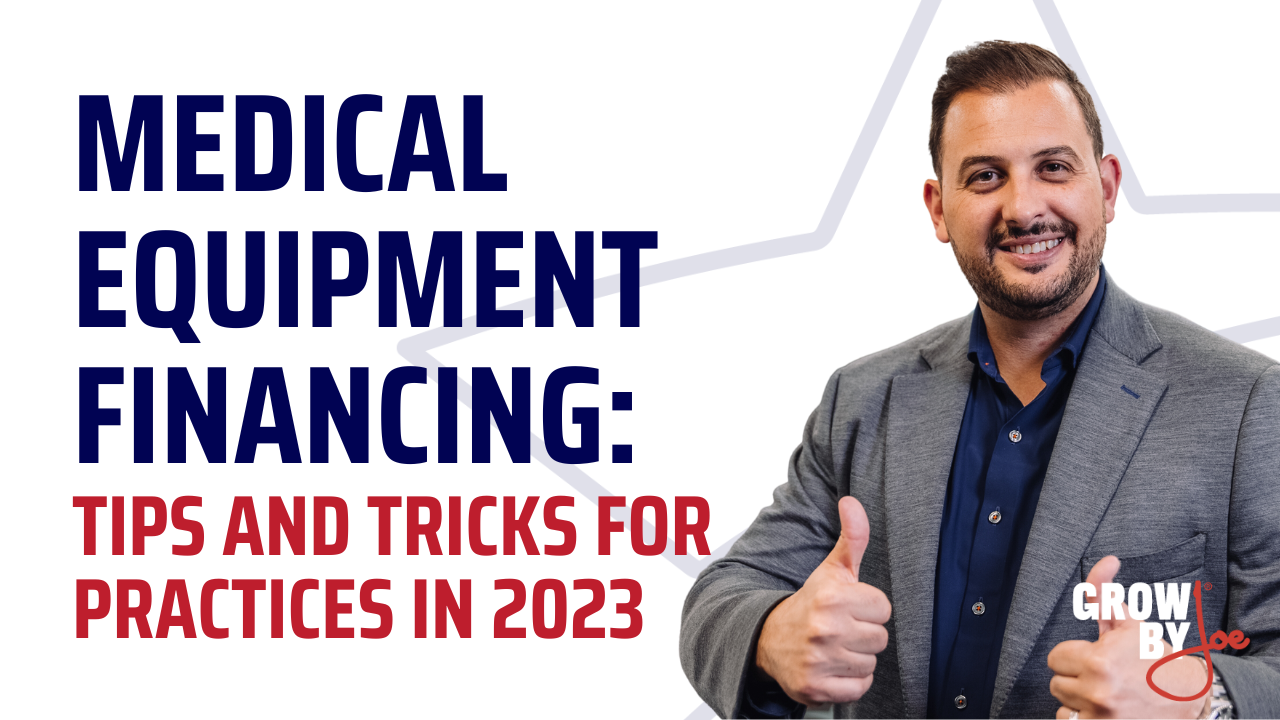Considering opening your own medical practice? There are a number of reasons why many healthcare professionals make this decision. It can allow you to gain greater autonomy, more work-life balance and can even significantly increase your earning potential.
Still, opening your own medical practice is a lot of work – especially in the beginning. You’re essentially launching a business, so it’s only fitting to have to start thinking like a business person.
Whether you’re just starting your medical practice or you’re looking to expand, medical practice loans can be a critical lifeline for healthcare professionals in this space.

What Is a Medical Practice Loan?
A medical practice loan is a type of loan designed to provide healthcare professionals with the funding they need to start, operate, or grow a medical service business. The total amount that companies can borrow for medical practice loans may vary per lender, usually starting from $25,000 and reaching up to $5,000,000.
Many lenders are willing to offer medical practice loans to doctors, dentists, physicians, and more. Lenders see this funding type as a good investment because of the high-income potential and ability of these businesses to generate returns.
This can work in your favor. In fact, medical practice loans are sometimes easier to acquire than other types of business loans, especially those pertaining to riskier industries.
Medical practice loans can be used to launch or grow a medical practice. They can also help finance the acquisition or purchase of an existing practice.
These loans can help cover initial startup expenses but can also be used to cover operating costs even when your business has become successful. Healthcare professionals will use medical practice loans to cover staff salaries, cash flow fluctuations, medical equipment, office renovations, software programs, and more.
Most options for medical practice startup funding today are geared toward medical professionals that are already licensed. However, in some cases, you may be able to secure a medical practice loan while you’re still in residency.
How Do Medical Practice Loans Work?
Medical practice loans work similarly to other types of business loans. However, an extra layer of verification may be required in some cases. For instance, your lender may ask to review your medical license and the type of medical business you operate. This is in addition to your business licenses and personal information.
You’ll start by pinpointing a lender. You can also opt for a business financing platform like National – which allows you to connect with multiple lenders at once and compare different offers.
Make sure to go over the exact requirements you’ll need to provide with your lender. From there, you’ll gather your personal and financial information. If you’re already operating a business, you’ll need to provide specific information and financials pertaining to your existing medical practice.
If you plan on buying another business, you’ll need information about that practice. Once you meet your lender’s requirements, you should be able to be approved for funding.
The amount of time it will take to process your application and receive your funds will largely depend on the type of lender you’re working with. Banks are known for having stricter requirements and slower processing times. Online lenders, on the other hand, can be more lenient and faster at depositing funds.
Benefits of Acquiring Medical Practice Loans
Medical practice financing offers many benefits to growing entrepreneurs. Let’s explore a few of the most prominent.
- Streamlined cash flow
- Increased purchasing power
- Ability to quickly take advantage of growth opportunities
- Opportunity to upgrade or maintain equipment
- Freedom to grow your practice as you choose
Whether you secure a lump sum of funds or establish a resource to draw funds from as-needed, medical practice loans allow doctors and medical businesses to quickly and easily access essential growth capital.
How Can You Use a Medical Practice Loan?
You can use a medical practice loan for a variety of purposes, such as covering the initial costs for your new business, purchasing equipment, acquiring an existing business, or promoting your medical practice.
Medical practice loans can be used in a variety of ways to help you start and grow your business. Oftentimes, medical professionals will put funds from a medical practice loan towards one or more of the following purposes.
- Startup Costs – When you first start, your major expenses will include your office space, medical equipment, supplies, office furniture, staff, advertising costs, and more.
- Acquire Existing Medical Practice – If you’re not up for the heavy lifting that comes with launching a medical practice for the first time, you can always acquire an existing business. It can be expensive, but a medical practice loan can make the cost more manageable.
- Advertising to New Customers – Even after you’ve opened the doors of your new medical practice, you can’t expect patients to simply stroll in. You may want to consider investing in social media campaigns, hosting events, Google Ads, search engine optimization (SEO), and more.
- Equipment Purchases – Medical equipment is one of the biggest expenses associated with owning a practice. If you’re purchasing a larger item, such as an x-ray machine, retinal scanner, or even an ambulatory vehicle – you’ll likely need help footing the bill.
- Salary and Benefits – You’ll likely need to hire other medical professionals, office employees, or even a secretary to assist you. A medical practice loan can help you cover the basic costs associated with hiring and paying your employees.
- Business Debt Refinancing – If you’ve taken out debt in the past to launch your medical practice or cover its operating costs, you may be able to refinance and secure a lower interest rate or more manageable payment. Refinancing business debt can sometimes help you save money and maybe even pay off of debt faster.
- Office Upgrades and Renovations – Whether your medical practice is new or you’ve been in business for some time, it’s possible you may want to make changes to the physical layout or design. Medical practice loans give you the flexibility to add extra exam rooms or upgrade certain spaces.
Who Can Apply for Medical Practice Loans?
Fortunately, medical practice loans can be used for a large variety of healthcare and wellness businesses. For the most part, lenders may not be too strict when it comes to the nature of your services.
Types of businesses that have been approved for medical practice loans include:
- Physicians
- Plastic surgeons
- Psychologists and psychiatric professionals
- Chiropractors
- Eye doctors
- Nurse practitioners
- Pediatricians
- Dermatologists
- Wellness professionals, such as chiropractors, reiki professionals, etc.
How to Get a Medical Practice Loan
Once you’ve decided to finance your growth, you’ll look for lenders offering the product of your choice. However, there are a few steps you should take before this to ensure you’re in the right headspace.
- Assess Your Business Financials – Take note of all your expenses, how they change from month to month, and how your cash flow handles each one to determine a safe level of debt to take on.
- Research Lenders – Search for lenders that can work with you, taking into consideration their offered programs, reputation, and qualifications.
- Prepare Your Documentation – While the specific documents you’ll need will depend on the lender you’re working with, you should prepare
- Proactively Strengthen Your Credit Score – If possible, you should consider taking steps to build your credit before applying for financing. You can pay off existing balances, request discrepancies be removed from your history, and avoid opening new credit accounts leading up to your application.
Business Loans Providers for Healthcare Professionals
You can visit a bank or credit union, but keep in mind that these lending organizations carry higher eligibility requirements than non-bank lenders.
Here’s a breakdown of the lenders you can apply with for medical practice loans.
| Type of Lender | Description |
| Small Business Administration (SBA) | The SBA offers a number of different financing products through participating lenders. Participating lenders can be found online or through local banks and organizations. SBA loans feature low-interest rates, high funding amounts, long terms, and can be used for a large range of business expenses.
The downside to SBA loans is that they can be fairly difficult to qualify for. You’ll need good credit, at least 2 years of business history, and be able to meet the SBA’s size standards. |
| Banks and Credit Unions | Banks and credit unions can offer lower interest rates and favorable terms. You can find a variety of loan products at these types of institutions, like term loans, business lines of credit, equipment financing, and more.
Despite the benefits, these institutions have strict lending requirements, which may exclude some businesses from funding, especially if you’re just starting your medical practice. In order to qualify at a bank or credit union, you’ll need good credit, a minimum 2 years of business history, strong revenue, and maybe even collateral. Banks and credit unions also have longer application processes, and they may not be ideal if you need funding fast. |
| Non-Bank Lenders | Online lenders are more lenient when it comes to requirements and also more likely to fund early-stage companies – like when you’re just starting your medical practice.
They also have a wide range of lending products, such as term loans, lines of credit, invoice financing solutions, and more. Plus, online lenders are known for having incredibly fast processing times. In many cases, funds deposit in 24 hours or less. The downside is that online lenders can sometimes be more expensive. Especially if you have poor credit, your interest rates may be higher than those on bank loans. |
| Marketplaces | Marketplaces combine multiple non-bank lenders into one centralized platform, allowing businesses to apply once and receive multiple offers.
This option is best for the on-the-go entrepreneur. Some marketplaces, like National Business Capital, complement their financing options with ROI guidance and strategies to maximize the benefit of a borrower’s financing. |
Meeting a bank’s strict eligibility requirements isn’t always possible, nor is reaching an approval when credit conditions tighten, and banks slow their lending. For this reason, non-bank lenders have become a popular resource for growing entrepreneurs, allowing a wider range of businesses to access the capital they need to reach their full potential.
Types of Medical Practice Loans
The most common types of medical practice loans include term loans, which provide a sum of capital to be repaid over regular installments with interest, and business lines of credit, which provide a credit limit that can enable the funds again as they are getting paid down.
Take a look at how these funding options compare so you can select the best fit.
| Type of Financing | Description |
| Term Loans | This funding type provides a lump sum of capital which you’ll repay over regular installments. They can be short-term, ranging less than a year. They can also be long-term – as long as 25 years.
Term loans are ideal when you know the exact cost of a particular project or asset you’re looking for finance. They can be used for operating expenses, buying equipment, purchasing real estate, renovations, hiring staff, acquiring another business, refinancing, and more. |
| Business Line of Credit | Business lines of credit are one of the most flexible financing options available.
You’ll be granted a set credit limit, which you’ll be able to borrow from as you need. Interest applies only to the amount drawn and not the total credit limit. As you pay down your balance, funds will become available again. Business lines of credit are ideal when you don’t know the exact costs of a certain project or renovation. They can also be used to fund almost any type of business expenses, such as operating costs, supply purchases, advertising, renovations, employee salaries, and more. |
| Equipment Financing | Equipment financing is a specialized product designed specifically for business equipment purchases.
Medical practices can leverage this solution to purchase new equipment, like X-ray machines, ventilators, and anesthesia machines, and bring their business to the latest technological standard. It can even be used to purchase waiting room decorations. Even better, financing equipment may qualify your business for certain tax advantages, like Section 179. |
What Are the Requirements for Healthcare Small Business Loans?
While requirements for healthcare small business loans and other types of financing may vary, most medical practice lenders will ask for your business financials, credit score, availability of collateral, as well as personal financial history in order to evaluate your situation.
As mentioned, online lenders are known for being more lenient and willing to approve newer medical practices. Banks can be more rigid – oftentimes willing to work with only established businesses. They’re also more likely to require collateral.
Nevertheless, there are a few common similarities. At a glance, you should still expect to provide the following:
- Business financials (if you already have one), including balance sheets, bank statements, tax returns, profit and loss statements, debt to equity ratio, expense ratio, cash flow history and projections, and debt schedule
- Credit scores
- Availability of collateral
- Legal documents, including business licenses, medical licenses, and registrations
- Personal financial history, including bankruptcy or existing liens
SBA Requirements For a Medical Practice Loan
If you’re hoping to secure SBA funding, you’ll have to meet aside requirements in addition to the ones outlined above. These include:
- For-profit business
- Located and operated within the United States
- Business owners must have invested equity
- Demonstrable need for financing
- Zero outstanding debt to the U.S. government
- Business owners can’t be on parole
How Do You Apply for Medical Practice Loans?
Here are the basic steps of applying for medical practice financing.
- Research lenders
- Determine 5-10 top choices
- Prepare your documentation
- Fill out applications
- Wait for decisions
- Review approvals
- If one makes sense, finalize the contract and receive your funds
Applying for medical practice loans is a relatively straightforward process. Finding the best offer, though, isn’t as easy.
When you receive approvals, it’s important to forecast and see how that specific offer could work in your day-to-day. It won’t be 100% accurate, but use the data you have available to get as close as possible, so you can see how each offer will affect your normal operations.
Why Choose National Business Capital for Medical Practice Loans?
Whether you’re beginning your medical practice for the first time, acquiring another practice, or need help funding your business – medical practice loans can offer much-needed capital to help you reach your goals.
That said, it never hurts to have more than one option for financing. If you’re looking to compare numerous medical practice loan offers – or any business loan, for that matter – you don’t have to apply with multiple lenders.
National is a top online small business financing marketplace that generates personalized lending offers based on your specific criteria and needs. You can browse various funding products, rates, and terms you qualify for before selecting the best fit. Learn what business financing solutions you qualify for here.
Frequently Asked Questions
How can medical practice loans help your healthcare business?
Medical practice financing allows medical businesses to quickly secure funding to solve challenges, invest in growth, and keep up with competitors. Instead of waiting for your cash flow to support a new investment, you’ll supplement your income with borrowed funds, take advantage of the opportunity, and repay over a more manageable schedule.
You can purchase new equipment to bring your practice to the latest technological standard, start a marketing campaign to attract new patients, or renovate your waiting area to accommodate more clients at a time – the choice is up to you.
Are there restrictions on medical practice loans?
Some financing products come with restrictions, but these are more lender-specific than product-specific. Generally, you can leverage medical practice financing for almost any business purpose, although you may need to provide your lender with a detailed business plan of how you intend to use the funds before reaching an approval.

Phil Fernandes
Phil Fernandes serves as Chief Operating Officer for National Business Capital. He boasts 15 years of experience in sales and 10+ years of management experience as National’s VP of Financing/Analytics. Phil is also an excellent writer who's completed the Applied Business Analytics executive program at MIT and regularly contributes articles to National Business Capital’s blog.
Accelerate Your Success
Seize the opportunity to grow your business and gain access to the capital you need.






